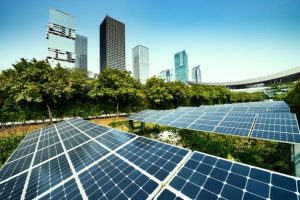Eighty percent of U.S. companies have sustainability initiatives in place, according to a new study released by Honeywell.
Businesses around the world are taking notice of their carbon footprint, and sustainability has fast become an important investment—and commitment—for companies across all industries. A company can achieve numerous benefits by investing in a sustainability roadmap—from lowering the operating costs of its buildings to being viewed as a leader in sustainable operations.
The new research from Honeywell, in partnership with The Business Journals, documents an evolving sustainability landscape for commercial buildings—particularly office buildings—and outlines the top sustainability measures companies should take over the next year.
To understand how companies are approaching sustainability, the study surveyed almost 1,200 U.S. business executives who work for companies of 50 or more employees across a range of industries that include manufacturing, construction, logistics, and retail, among others.
Businesses with Sustainability Plans Aim to Meet Their Carbon Pledge
Launched in 2000 to encourage design of buildings that support the needs of people and nature, the U.S. Green Building Council’s Leadership in Energy and Environmental Design (LEED) rating system has prompted growth in sustainable building initiatives. In fact, 4,740 commercial projects earned LEED certification in 2020, despite the challenges posed by the COVID-19 pandemic.
The top criteria evaluated for LEED certification—energy use, recycling, and water efficiency—align with the top three sustainability initiatives mentioned by survey respondents for the next 12 months.
Also, nearly all survey respondents (93%) saw sustainability as a lasting priority, and 87% viewed it as a long-term investment rather than a cost. Sustainability has evolved from a fashionable trend to a business imperative as the world continues to manage the short- and long-term effects of climate change.
Eight of 10 U.S. surveyed businesses currently say they have sustainability initiatives in place. Leaders are realizing that making their buildings more energy efficient not only reduces building management and maintenance costs, but also contributes to a healthier workplace and increases competitive advantages.
Sustainability Is Evolving for Commercial Buildings
As businesses recover from the disruptive effects of the pandemic, leaders are concentrating on restoring profitability and pursuing sustainability initiatives—most of which focus on the physical spaces their companies occupy.
Property managers are reaping tangible benefits from making their buildings more sustainable—from reduced heating, cooling, and operating costs to the ability to lure tenants with more environmentally friendly structures.
According to the survey findings, energy-efficient lighting, HVAC optimization, and waste management top the list of initiatives currently in place by both executives who occupy company-owned offices and those in leased office space (who are familiar with the building owners’ sustainability initiatives).
Honeywell’s survey also found that, of respondents who lease office space to tenants, 60% will invest in new technology to enhance sustainability in the next six to 12 months. In addition, 53% say they have discussions with new tenants about their sustainability goals.
From the tenant’s perspective, a more efficient building can offer a competitive advantage in attracting workers. In fact, Honeywell’s survey analysis references the U.S. Green Building Council’s research that found that employees who work in LEED-certified buildings are healthier, happier, and more productive than their counterparts who occupy conventional buildings.
Sustainability Is Here to Stay
Sustainability in commercial real estate is here to stay, and the new bottom line for companies embraces people, planet, and profit. More executives are seeing sustainability as a potential force multiplier for competitive advantage rather than simply as a means of demonstrating responsible corporate citizenship.
Honeywell notes it has made its own long-term commitment to carbon reduction. The company recently committed to being carbon neutral in its operations and facilities by 2035. This initiative represents the next step in a sustainability effort that began in 2004 and has already reduced greenhouse gas emissions by more than 90%.
Like energy, time is much too valuable to waste, and that’s why it’s important to create a sustainability plan now—one that will help reduce resource consumption, avoid waste, and comply with the changing environmental and governance requirements, according to Honeywell.

